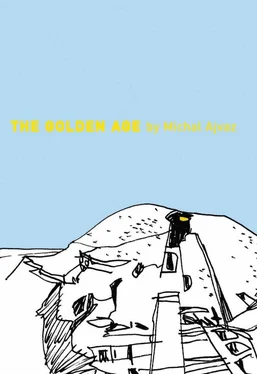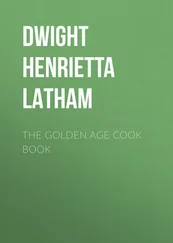Michal Ajvaz - The Golden Age
Здесь есть возможность читать онлайн «Michal Ajvaz - The Golden Age» весь текст электронной книги совершенно бесплатно (целиком полную версию без сокращений). В некоторых случаях можно слушать аудио, скачать через торрент в формате fb2 и присутствует краткое содержание. Год выпуска: 2010, Издательство: Dalkey Archive Press, Жанр: Современная проза, на английском языке. Описание произведения, (предисловие) а так же отзывы посетителей доступны на портале библиотеки ЛибКат.
- Название:The Golden Age
- Автор:
- Издательство:Dalkey Archive Press
- Жанр:
- Год:2010
- ISBN:нет данных
- Рейтинг книги:4 / 5. Голосов: 1
-
Избранное:Добавить в избранное
- Отзывы:
-
Ваша оценка:
- 80
- 1
- 2
- 3
- 4
- 5
The Golden Age: краткое содержание, описание и аннотация
Предлагаем к чтению аннотацию, описание, краткое содержание или предисловие (зависит от того, что написал сам автор книги «The Golden Age»). Если вы не нашли необходимую информацию о книге — напишите в комментариях, мы постараемся отыскать её.
is Michal Ajvaz’s greatest and most ambitious work.
The Golden Age
The Golden Age — читать онлайн бесплатно полную книгу (весь текст) целиком
Ниже представлен текст книги, разбитый по страницам. Система сохранения места последней прочитанной страницы, позволяет с удобством читать онлайн бесплатно книгу «The Golden Age», без необходимости каждый раз заново искать на чём Вы остановились. Поставьте закладку, и сможете в любой момент перейти на страницу, на которой закончили чтение.
Интервал:
Закладка:
If left to their own devices, each of these longings would eventually wreck the process of reading and bring about the collapse of the Book . The reader who started on the insertions would never reach the end; indeed, at the moment he entered the first he was signing himself over to the devil of the deep, and as such was lost. This vigorous, crafty devil would draw him in ever deeper until he was a prisoner of insertion hell, a dark, cruel subterranean world of text from which there was no escape. And the devil would chuckle to himself as the quest for an illusory bottom made the reader more and more feverish.
There was no stopping place. Not even the final inscription in the innermost pocket could provide salvation, as this, too, sprouted a multitude of insertions which became visible only as they were reached; although these insertions were as yet textless, their intention was plain — the phantom blossoms of parenthetic pockets of the future were hovering over the paper. The poor reader wished to read on, but though he sensed the proximity of the next word it eluded his grasp. There it was, shimmering on the shore, promising salvation — but he just couldn’t get through to it. It eluded him as the tortoise eludes Achilles: between this next word and the last there opened up a bottomless gulf of real and imaginary insertions. The Book collapsed in on itself; it became a weeping wound in which were gathered words visible and invisible, words wriggling like maggots. To stop reading, thus escaping the undertow of the gulf, was not an option. One knows that the Book itself is a kind of insertion: once inside the Book , it is impossible to resist this dark surrender. Once the wound in the Book is opened, the constellations begin to quake and then the cosmos caves into the oozing depths.
Although the second longing — to skip all the insertions — spares the reader the hell of subterranean text, it, too, bears along in its wake the collapse of reading and the disappearance of the Book and the world. There is no satisfaction in skimming the surface, leaving all pockets sealed. As I have said, the Book itself is one big insertion: it was born when the hum of calm was fractured and words began to stream out of it; the entire Book is enclosed in an invisible pocket. The reader feels a longing to change this imaginary pocket into a real one made of the island’s paper and to seal the whole Book inside it so that the obscenity and disgrace of words are covered up. In this way the Book would disappear, but not even this would satisfy the yearning for the simplicity of undispersed radiance. Whoever encountered the Book as an insertion would realize that the substance into which the Book was inserted was itself only an insertion — an insertion inserted into other insertions — and that as such it was a text of dubious character in which words gloss over what is important, its splendid emptiness.
Now the colours into which the white light had dispersed could be a cause of great anguish to the reader, just as the words into which the truth of the hum had dissolved had caused him great anguish previously; he would search the plain of colours as if it were a coat of loathsome splashes and slops befouling the radiant white of the void; he longed to erase the shame of colour and return to the original whiteness. All shapes would seem to him a needlessly long and rather banal interpretation of a number of basic geometric figures, but as soon as he restored these figures to the world of perception he would again be overcome by a sense of dissatisfaction; he would realize that they had originated through straight lines succumbing to the temptation to pursue various courses, that their potentialities were trembling within. Only after the discontented reader had rendered all figures into straight lines could the final act commence, and then it would dawn on the reader that the straight line itself — still, and inadmissibly — brings forth two courses which ought to remain folded within, in the blissful embrace of non-dimensionality. And here he would conclude his work (which had begun in the distaste for the contents of the Book ’s pockets) by pushing back into the non-dimensional point the straight line into which the whole world of shapes had been reduced.
Now to the changes which were made to the Book by transcription and overwriting. The island reader always thought of the Book as a palimpsest, a manuscript written over another manuscript; the surface text always evoked the original, which insinuated itself between the letters — sometimes forcefully, sometimes more subtly — in an attempt at restoration. Over time, I, too, came to view the Book in such a light, and now it is impossible to for me to rid myself of the urge to look at books as I looked at the Book —when I read these days, another tale, the translucent pages of another book rise gently to the surface of the open pages of the actual book, before subsiding like the wings of a great, ghostly butterfly. This is how words and sentences came to be expunged and replaced by other words and sentences. It was easy to wash characters written in fruit juice from the reed paper before replacing them with others. Indeed, it was perhaps too easy; in the upper town, where water was forever streaming from various directions and the reader sometimes carried the Book through a wall of water, it was not an infrequent occurrence for a whole passage to be erased.
The islanders understood words blurred into smudges as still readable text; the last way in which the Book transformed was not a washing clean of the paper but an erasure by which the text disappeared and was not replaced. There were three ways in which erasure could occur: a page or pages were pulled out and the violated foldout was resealed; or pockets of insertions were removed; or written words were washed away without their being replaced by new words or figures. I remember a time when readers were going through the Book like mushroom-pickers through the woods, plucking out insertions so that very few remained. The Book became a thin volume which might have dwindled away to nothing; I imagined an isolated scrap of paper bearing its last remaining sentence, its last remaining word as it was carried away by the island wind. (But this paper flake might be the seed out of which a new Book could grow; in this new Book the contents of the old Book would return as a dream.)
There was also a time when the pages and pockets of the Book remained in place while they shed words and sentences, leaving a blank space on a page or even a whole page which was blank. This disappearance was quite different in kind from that given by the pulling out of pages and insertions, and the Book did not become any thinner. The whiteness spread rapidly and it seemed possible that soon the reader would have only white pages to leaf through, that he would open pocket after pocket to find nothing but blank pages. As you can see, the Book led a rich existence thanks to the several ways by which it could approach nothingness.
Looking for the beginning
For a time I tried to find the Book ’s original layer, the first passage out of which the Book grew by insertion, transcription and erasure. It may be that such an undertaking was within the bounds of realizability, but it proved so difficult that I gave it up. It certainly was impossible to identify the oldest layer by its content; the constant modifying of the text meant that it was far from out of the question that the oldest passages were those which told of the latest technical discoveries, about which the islanders had learned from sailors. To begin with I imagined it would be possible to identify the oldest text by the level of insertion at which it appeared. The fact that the Book grew mainly through insertion encouraged the assumption that the manuscript was like an inverted Troy, where the oldest layers were on the surface (in the Book ’s larger foldouts) and those which had been written and stuck in only yesterday were at the deepest level of insertion. The task of a textual archaeologist would be to monitor closely the surface while resisting the temptation to go beneath it.
Читать дальшеИнтервал:
Закладка:
Похожие книги на «The Golden Age»
Представляем Вашему вниманию похожие книги на «The Golden Age» списком для выбора. Мы отобрали схожую по названию и смыслу литературу в надежде предоставить читателям больше вариантов отыскать новые, интересные, ещё непрочитанные произведения.
Обсуждение, отзывы о книге «The Golden Age» и просто собственные мнения читателей. Оставьте ваши комментарии, напишите, что Вы думаете о произведении, его смысле или главных героях. Укажите что конкретно понравилось, а что нет, и почему Вы так считаете.












